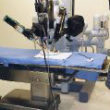Retrospective review of patients who developed peritoneal carcinomatosis following robot-assisted radical prostatectomy
The authors conducted a retrospective review of patients who developed spread of cancer cells
throughout the abdomen (called “peritoneal carcinomatosis”) following robot-assisted radical
prostatectomy. Five cases were identified. The patients developed the disease between 8 and
13 years after the surgery. Four of the five cases had spread of the cancer outside the prostate
(called pathologic stage T3 disease) at the time of prostatectomy. Certain clinical factors, such
as advanced pathologic stage at the time of prostatectomy may predict risk for carcinomatosis
following robot assisted radical prostatectomy. Next generation imaging modalities such as the
new PSMA PET scan may aid in identifying these metastases and are likely to identify increasing
numbers of these patients as this new imaging method becomes more widely available.
Continued documentation and classification of this atypical presentation are needed to
improve the understanding of the underlying causes and the most effective management
strategies.
Urology. 2022 Apr 23:S0090-4295(22)00296-5.doi: 10.1016/j.urology.2022.04.002. Online ahead
of print.




















